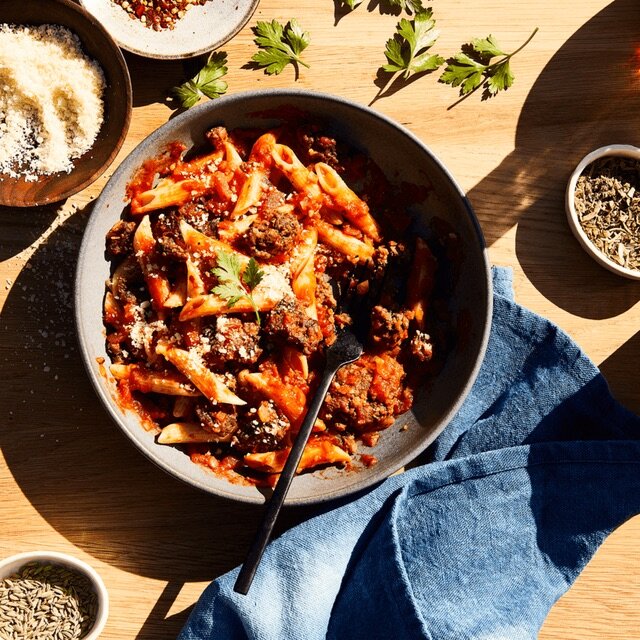Are We Ready for a Plant-based Diet?
The plant-based diet is the newest kid on the block. Is it just a fad, trending after the likes of impossible burgers and tofu cheesecakes? Apparently not.
The plant-based diet has been around for quite a while. Dr. T. Colin Campbells, PhD, one of the most distinguished nutrition scientists in the past century, introduced the plant-based diet in the early 1980s. He used the term “plant-based” to separate diet science from vegan ethics.*
Impossible Burger, Impossiblefoods.com
Impossible Penne Arrabiata, Impossiblefoods.com
Plant-based, vegan and vegetarian are often used interchangeably. But there are key differences in these three diets.
Vegan completely eliminates all animal products including dairy, meat, poultry, fish, eggs and honey.
Grilled tofu and dragon fruit buddha bowl, Mccormick.com
Vegetarian includes eggs and dairy, but excludes meat, poultry and fish.
Plant-based does not mean meatless, nor eliminates animal products totally. Its focus is on eating more food that come from plant sources like fruits, vegetables, nuts, seeds and whole grains. This diet also emphasises eating whole foods that have undergone little or no processing, and it stays as close to its natural state as possible.
Sustainability, food security and health are at the forefront of the plant-based food revolution.
Case studies on health benefits indicate that regularly consuming more plant-based foods that are high in proteins like beans, legumes and tofu (vs. animal protein) can help in preventing, managing and potentially reversing chronic conditions including diabetes, heart disease, hypertension and cancer. Moreover, they are packed with natural fibres and nutrients that boost immunity, fight inflammation and keep the gut healthy.
Vegan Tofu Cheesecake with Lemon & Poppyseeds, cinnamonandcoriander.com
The buzz on plant-based diet is real and is fast catching on. Are we ready for a plant-based diet?
A global consumer research conducted by Innova Market Insights shows that 3 out of every 5 shoppers are looking to incorporate more plant-based foods into their diet. Plant-based consumption is accelerating from food trend to food revolution status.* It is now a multi-billion dollar market, which is projected to grow at a CAGR of 11.9% from 2020 to 2027 to reach $74.2 billion by 2027.
Sustainability, food security and health benefits are but some factors driving plant-based innovations. Start-ups, multinationals as well as venture capital funds are fuelling this sector’s growth trajectory.
Headquartered in New York, Big Idea Ventures (BIV) is a venture capital fund with start-up accelerators in key locations, investing in and accelerating top performers in the new food space.
BIV’s New Protein Fund (NPF), worth US$50 million, is investing in the most innovative companies working on plant-based meat, seafood and dairy products; cell-based meat, seafood and dairy products as well as ingredients and technologies that facilitate the growth of these categories. It combines capital, mentorship and a strong ecosystem of partners to support and grow the world’s most compelling plant-based and cell-based alternative protein companies.
Fergus Balfour, Mentor at Big Idea Ventures
Weekly Sparks talked to Fergus Balfour, former CEO of Classic Fine Foods. He was asked to come onboard to assist the Singapore arm of the BIV group after he participated in a seminar that was linked to private equity companies, and where BIV owner Andrew Ive was leading a section of this seminar. Fergus has been a mentor within BIV’s NPF since 2019.
“The New Protein Fund Accelerator invests US$125K cash and US$75K in kind to worthy ventures. Over five months BIV/NPF, which has an arm in Singapore, works side by side with companies to help them prepare for massive growth and scale. They are assisted by a group of mentors, advisers and investors,” says Fergus.
BIV’s Accelerator Programmes pick the best companies and support them in their first five months until they are ready to compete for funding. There is no shortage of capital and, given they are on their third cohort of companies, there appear to be plenty of good ideas.
The numbers are staggering. But who benefits from it? Why is it important? Is it achievable and sustainable? Fergus provides these insights.
Who will benefit from it? Ultimately, consumers who have been looking for an alternative to, for example, meat, seafood and dairy products. More publicity helps to make us aware that our climate is under pressure and the way that we grow food is part of this. This provides an opportunity for new entrepreneurs to build new businesses.
Why is it important for the future? The current way that food is grown is putting great pressure on the environment and new ways need to be found to mitigate this pressure.
Take Singapore, for example. It largely imports its food. In the future, the government would like to ensure that 30% can be locally sourced which requires considerable innovation given the size of Singapore and its limited natural resources. Temasek is one of the key investors in BIV.
Shrimp dumplings by Shiok Meats
Angie’s Tempeh
Is it achievable? Plant-based food has been around for a number of years, but it is only recently that there has been sufficient interest for large players to invest and for entrepreneurs to come forward and take the risk.
Cell-based food production is more recent but the technology now exists to scale this up and to make it affordable. Consumers, particularly millennials, are much more open and interested in this area. For example, if you see documentaries on Shiok Meats you can see how the supply chain costs are falling each year.
Is it sustainable? The basis of the business model is sustainability. Plant-based products are often sourced from by-products that are already grown and cell-based products are grown from living animal cells. The focus on the business from the start is reducing the impact on the environment.
For example, scientific data shows that by consuming meat made from plants instead of meat made from animals, our carbon footprint could be drastically reduced, and that it would save water supplies and help ensure that planet earth will remain viable for future generations.
Will it have mass appeal to persuade consumers to shift to a plant-based diet? Yes, plant-based food must compete and be comparable with meat-based products in taste, texture and pricing.
The plant-based products must taste as good as the food they are seeking to replace. It must have a similar texture, mouthfeel and appearance. Positioning is important; the point of comparison can be chosen carefully– for example, mince is easier to replicate on look and feel rather than a complete steak.
The pricing needs to be similar, too. In the case of pork, this category has been increasing in price because of shortage, so competing here is made more possible.
The added appeal of a plant-based diet is in the area of responsible business.
Quorn Meat Free Lasagne, quorn.co.uk
Impossible Street Tacos, impossiblefoods.com
Fergus continues: “Nowadays, progressive companies realise that it’s no longer purely about making profit. This has been more evident in 2020 when Covid-19 forced industries to re-assess the way they operate.
Particularly post-Covid, I think all consumers and, increasingly, investors are examining the environmental credentials of every business and comparing them to competitors as they decide if they want to buy or invest.
The phrase you hear is “Build Back Better” and with climate change (heat waves, sea rising, tropical storms) being carried on the news throughout the world there is a heightened awareness for all consumers.
In addition millennials and Generation Z are very aware of their ability to influence what happens and are much more open to taking action and to eating food from novel sources.
It is also clear that major investors have connected the fact that their investment returns are linked to how sustainable companies are, quite apart from government action, which is seeing the need to raise standards like in the USA and China.
In simple terms the leaders of businesses must now understand how to make money and profits and minimize their environmental impact. The circular economy is with us.”
As I dig deeper into the subject, there is a lot of information offering advice from recipes to online and/or offline offers from retail outlets.
Sweet and Sour Quorn Meat Free pieces, Quorn.com
In Singapore, I can name at least three plant-based food brands that I know of. Beyond Meat offers a range of meatless beef patties, Italian sausages, meatballs and ground beef. Heura, specilising in soy-based chicken, is a perfect match to local and Asian dishes such as chicken rice, tandoori chicken, Thai chicken basil and even laksa. Quorn, a UK-based meat alternative brand has fishless fingers, vegan fillets and spicy burger patties on shelves of Cold Storage and FairPrice supermarkets.
Mad Coffee, vegconomist.com
Otis Oat Milk
In addition, Singapore’s own home-grown meatless brands Angie’s Tempeh, Shiok Meats and the newly launched Mad Foods are bursting with flavours.
Are we ready for a plant-based diet? I think we are. Remember, it doesn’t mean that we have to entirely give up bacon, or that chunky steak (whew!).
Debbie | ws
Angie’s Tempeh | Shiok Meats | Mad Foods | Big Idea Ventures | *nutritionstudies.org | *edlong.com
Recipes to try: Impossible Food | Breakfast & Brunch | Easy Recipes












